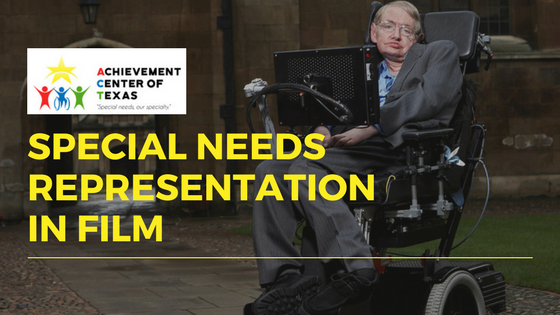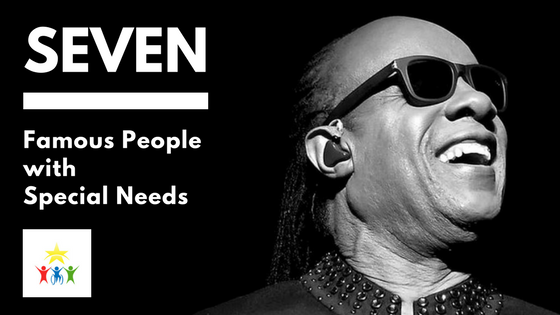Special Needs Representation in Film
“Stephen Hawking at Gonville & Caius College, Cambridge” by Lwp Kommunikáció (edited)
The Best Years of Our Lives, Children of a Lesser God and Forrest Gump are all moving, Oscar winning films spanning across the past century. They’re all about disabled individuals overcoming great obstacles with all odds stacked against them. The presence of disabled individuals in film has exposed viewers to new perspectives, shaping their understanding of individuals with disabilities.
Some films accurately portray people with special needs while others may portray them in a distorted sense. They may underestimate their abilities. They may define individuals by their disabilities rather than portray their disability as a situation individuals may just happen to be in. Either way, the media has a strong influence over how individuals grow to interpret different people under different circumstances.
The media is greatly responsible in shaping our perspectives.
What makes a good film with special needs representation?
A good film featuring special needs characters must recognize the hardships those characters must face. It must also recognize those characters for more than their disability.
People with special needs are just that: people. They are people with emotions, responsibilities and ambitions. They are people working for their independence, people with aspirations. A film centered on individuals with disabilities and their circumstances understands this. It works to achieve a more accurate, three-dimensional portrayal of their characters.
Like in any good film, films about special needs individuals must go beyond surface-level interpretations. A good film about disabled individuals makes audiences aware of people with special needs and their abilities.
In order for a good film about special needs to be effective must also present an accurate portrayal of its characters. It should be sure to get their abilities right. It must portray their struggles but also highlight their strengths. However, it must also avoid exaggerating either of the two as well.
Special Needs Representation in Film – The Theory of Everything
The Theory of Everything makes for a good example of a movie that focuses on a more accurate, three-dimensional view of an individual with a disability.
The Theory of Everything is an intimate reflection of the life of Stephen Hawking, a renowned theoretical physicist who suffers from a debilitating condition. The Golden Globe Award winning film reveals the effects of Hawking’s Amyotrophic lateral sclerosis on not only himself but also on his relationship with his wife Jane.
While showing Hawking’s fight and struggles, the film makes sure to show the ups and downs of his relationship and his own aspirations. While highlighting Hawking’s contributions to the science world, the film makes it known that Hawking is so much more than his disability.
In the film, Stephen Hawking was depicted by British actor Eddie Redmayne. While Redmayne himself is able-bodied, he spent a significant amount of time preparing for the role.
His preparation included working with a choreographer to learn to mirror Hawking’s speech and movement. To learn how ALS progressively deteriorated Hawking’s abilities, Redmayne even crafted a chart as a reference point during filming. Redmayne also spent four months studying Hawking’s life.
Along with his acting talent, Redmayne’s efforts were appreciated as the Huffington Post said, “In large part, his acting is remarkable for its realistic portrayal of ALS.”
The UK newspaper, The Independent even recorded Hawking himself saying “I thought Eddie Redmayne portrayed me very well. At times I thought he was me. I think Eddie’s commitment will have a big emotional impact” after the film’s premiere. The physicist even shed a tear when he first saw the film.
The controversy of able-bodied actors playing disabled characters
While Redmayne was sufficiently prepared to undertake the role, he is still an able-bodied actor.
Since his character is disabled, controversy arose among critics tackling the issue. The Telegraph writer, Rob Crossan, who himself has a disability, wrote, “The performance is the latest in a long line of what detractors call ‘cripping up’: able-bodied actors taking on disabled roles, which some critics find as deplorable as the thankfully outdated practise of white actors pretending to be black.”
Opportunities are taken away from disabled actors
Many individuals, like Crossan, believe that giving roles of disabled individuals to able-bodied actors takes opportunities away from disabled individuals. They also find it especially infuriating when well-known and successful able-bodied actors decide to take on roles of individuals with special needs, like Tom Hanks did when he portrayed Forrest Gump.
However, this strips away opportunities that could easily be given to individuals with special needs, and further decreases the role possibilities that could be given to them. While able-bodied individuals are capable of playing characters with special needs, actors with special needs do not have that luxury. There are a limited number of special needs characters in film to begin with.
The situation worsens as, according to a study released by Ruderman White Paper, 95% of characters in the top ten television shows are portrayed by able-bodies actors. When even those roles are given to able-bodied actors, the roles actors with special needs can play are limited even further.
Actors with disabilities are able to provide a legitimate portrayal on-screen
Special needs actors also have their own genuine experience with their disabilities. These experiences in turn provide an innate background to the characters they may play. Able-bodied actors, no matter how experienced they may be, are unable to portray the genuine experience that actors with disabilities can.
American producer and writer Scott Silveri said about casting able-bodied versus disabled actors for special needs roles: “Because [able-bodied actors] have that specific point of view, you get a little taste of it. [Special needs actors] have their specific and unique experience through which you can tell really universal stories, but there’s a little kernel of something different.”
Special needs actors have been living with their disabilities, just like special needs characters. They may face the same struggles. They may face the same challenges. With overlapping lifestyle, actors with special needs are truly able to embody their fictional counterparts.
The pros of able-bodied actors playing special needs roles
Actors with disabilities may be unable to perform certain roles
However, it must also be understood that some individuals with special needs do not have the abilities to play their film counterparts. For example, in The Theory of Everything, Redmayne was required to play Hawking’s character both before and after his ALS diagnosis.
The movie was meant to chronicle Hawking’s personal life as his condition progresses. Hawking himself or another individual living with ALS could not play the role as they would not have the physical ability to play the character before his diagnosis.
In situations like this one, it becomes necessary for able-bodied actors to play characters with special needs.
The same holds true for individuals with mental disabilities who are unable to memorize lines. Additionally, people with special needs are sometimes unable to understand the fictional mindset that is required for actors playing certain roles.
In situations like these, individuals must understand that sometimes able-bodied actors are necessary in portraying individuals with certain disabilities. In these cases, able-bodied actors become the only alternative.
Individuals with special needs may not want to pursue acting
The special needs population is also relatively small, compared to the able-bodied population. This means that there may also be fewer disabled actors to begin with.
Not all individuals with special needs want to act in the first place. They may want to venture out and explore different career opportunities. These circumstances may call for able-bodied actors to take on the roles of disabled characters as well.
Still, if there are actors with disabilities who are willing and able, they should be given special needs roles. This is especially true as they will be able to play a genuine likeness to their characters.
The Takeaway – Special Needs Representation in Film
At the end of the day, it’s most important to incorporate more special needs characters in film.
The media shapes our ideas of normalcy and teaches us how different people, things and actions are treated and interacted with. The media helps develop the prominence of people with special needs.
Michael Barnett directed the documentary-film Becoming Bulletproof. The film chronicles the story of a group of disabled and non-disabled actors coming together as part of an inclusive arts project. The goal of the project was to make a short movie in the California desert, a mini-western called Bulletproof.
Barnett said of the film, “We wanted to make an exceptionally humanizing film, and to start a conversation about how disabled people, rarely seen on screen or in our media, are excluded from our wider culture. Why? And what are we missing when we reduce our human diversity?”
There need to be more films focusing on people with disabilities in order to increase their presence.
With more special needs people in film, awareness of disabilities increases. Conversations arise.
People with disabilities should not be hidden from the world but rather embraced. With increased media presences, people can learn more about disabled individuals and their lifestyles. Special needs individuals have the same aspirations as everyone else and deserve the same opportunities as their able-bodied counterparts.
What you can do to help improve special needs representation
At the Achievement Center of Texas, we work toward greater independence and a more satisfying way of life. We want to help individuals with special needs reach a level of independence where they can achieve their aspirations.
We want them to know anything can be possible for them, even acting in major, Oscar-winning films. Individuals with special needs have a lot of share with world. We believe they should be provided the resources and opportunities to play the roles they want to play both in film and life.
If you are a parent of a child with special needs and want them to know that their disability does not define them, please enroll with us at the Achievement Center of Texas. We would love to have your child at our center, where they can find the self-confidence to discover their talents.
At the Achievement Center of Texas, we are here to cater to the unique needs of children and adults with special needs and to equip them with the independence and creativity to pursue their passions.
To enroll in Day Care, Day Habilitation or one of our fun, extracurricular classes, please click the button below.
Help us make a difference.
As a 501(c)(3) nonprofit organization, the Achievement Center of Texas is genuinely dedicated to helping our students grow and develop. You too can help our students learn the skills to pursue their dreams by donating today!
In addition to cash, we also accept donated items. Anything, no matter the amount, can make all the difference for our students.
Please click the button below to donate.
About the Author
Meraal Hakeem is currently pursuing a Bachelor of Arts at the University of Texas at Austin. In her free time, Meraal enjoys reading, writing and volunteering with various organizations to raise awareness of different human rights issues present in her community.







